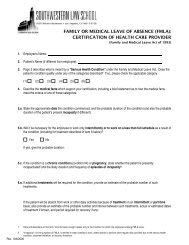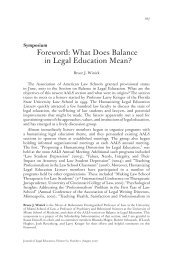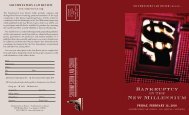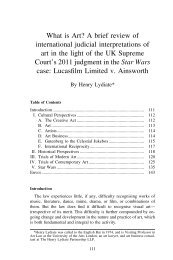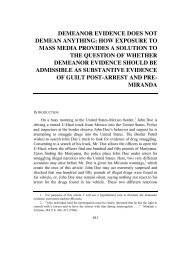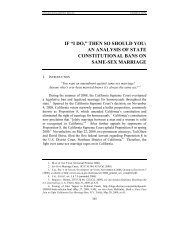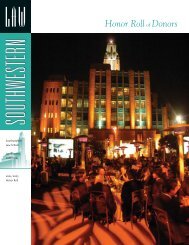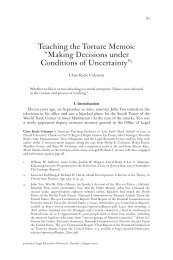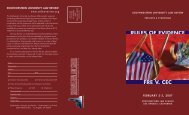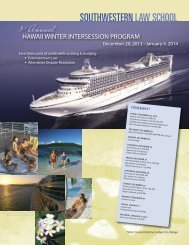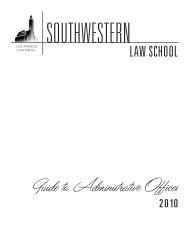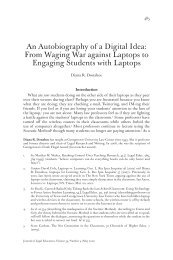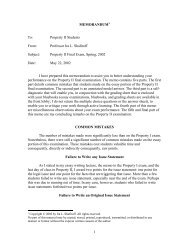S:\Externship Forms Revised May 2005\EXTERN POLICIES ...
S:\Externship Forms Revised May 2005\EXTERN POLICIES ...
S:\Externship Forms Revised May 2005\EXTERN POLICIES ...
You also want an ePaper? Increase the reach of your titles
YUMPU automatically turns print PDFs into web optimized ePapers that Google loves.
SOUTHWESTERN UNIVERSITY SCHOOL OF LAW<br />
EXTERNSHIP PROGRAM <strong>POLICIES</strong><br />
& GUIDELINES<br />
I. Purpose of Program<br />
In an effort to offer exceptional and diversified educational programs, Southwestern has developed a select<br />
number of off-campus placements, primarily with public agencies, public interest law firms, and state and<br />
federal judges. Placements are arranged to supplement the academic program. Students are permitted to<br />
experience the attorney's role directly through application of legal theory to actual cases, thereby gaining<br />
greater insight into the operation of law and legal systems. Stated simply, externships are an opportunity to<br />
put legal knowledge to work and to acquire lawyering skills in a real, as opposed to "moot" environment.<br />
II.<br />
General Requirements<br />
A. Curriculum Relationship: All externship programs will relate to the general law curriculum<br />
offered at Southwestern.<br />
B. Grading: All externships are graded Credit/No Credit.<br />
C. Unit Credit - Part-time Placements<br />
Regular Session: Part-time non-judicial externship placements are for 3 units of credit.<br />
Part-time judicial externships are for 4 units of credit.<br />
Summer Term: All part-time summer externships are for 2 or 3 units of credit. Four (4) unit<br />
externships are available during the summer session at the discretion of the Director of Externships.<br />
Students may not register for a 4 unit externship without prior approval of the Director.<br />
D. Unit Credit - Full-time Placements<br />
Full-time externships are for 10 units of credit (5 units for summer externships). Full-time<br />
externships are normally limited to judicial externships. All other requests for full-time externships<br />
will be considered on a case-by-case basis by the Director of Externships.<br />
E. Compensation<br />
It is the law school's policy not to mix monetary compensation with unit credit. As discussed below,<br />
because the law school looks to the field placement supervisor to function as a law teacher, injecting<br />
the factor of wages can distort an otherwise beneficial teacher-student relationship. Therefore,<br />
students may not accept monetary compensation for externship work. Where it is the practice of host<br />
agencies to pay an appropriate cost of living stipend for an externship, the extern may receive the<br />
stipend on the prior written approval of the Director of Externships.
Page 2<br />
F. Eligible Programs<br />
Permanent, on-going programs for student externship placements should be the norm. Temporary,<br />
one-time programs should not be approved for inclusion in Southwestern's externship program.<br />
Eligible programs should be administered by public agencies, courts, or not-for-profit entities.<br />
Placement of students in externship programs operated by profit-making enterprises should be<br />
allowed only to take advantage of particular opportunities that cannot otherwise be duplicated by<br />
placement in not-for-profit enterprises.<br />
III.<br />
Student Eligibility & Requirements<br />
A. Academic Standing: Students must be in good academic standing in the semester preceding their<br />
participation in the externship program and in the semester they participate in the externship.<br />
Additionally, first year day or first or second year evening or PLEAS students whose cumulative<br />
grades at the end of the Fall semester are at or below a 2.30 GPA are not permitted to enroll in an<br />
externship during the summer following that Fall semester. Second year day or second or third year<br />
evening or PLEAS students whose cumulative grades at the end of the Fall semester are at or below a<br />
2.30 GPA are not permitted to enroll in a second externship during the summer following that Fall<br />
semester.<br />
In addition, students wishing to participate in certain judicial externships must be in the top 30% of<br />
their class in the semester preceding their participation in the externship.<br />
B. Unit Credit and Length of Program<br />
Students may enroll for a maximum of 6 units of externship credit and may not take more than 11<br />
units of credit/no credit (i.e., Moot Court, Law Review, Law Journal, ITAP, Trial Advocacy,<br />
Externship), excluding those earned by transfer credit courses taken at another law school. The<br />
placement of a student in a full-time judicial externship will invariably exceed the credit/no credit<br />
limitation. Waivers, on a case-by-case basis, may be granted to accommodate such placements.<br />
Students must complete their externship in the semester or term they begin. Students may participate<br />
in more than one externship, subject to the unit limitation, but students may not repeat placements in<br />
the same program. A student who has failed to complete an externship program or who receives a<br />
grade of No Credit shall not be permitted to enroll in another externship.<br />
C. Student Application<br />
Students may apply for an Externship Program placement by filling out the Externship Application<br />
Form available in the Externship Office, Room W231. The completed Application and three (3)<br />
copies of a current resume must be returned to the Externship Office, Room W231. Students<br />
applying for a judicial externship must also submit a writing sample with their application (some<br />
non-judicial placements also require a writing sample, i.e., United States Attorney’s Office).
Page 3<br />
Students should begin the application process no later than:<br />
1. September 15 for Spring placements.<br />
2. February 1 for Summer placements.<br />
3. March 1 for Fall placements.<br />
[Note: Judicial externships are highly competitive. Students are encouraged to submit<br />
applications for judicial externships up to six months in advance.]<br />
Some federal placements require a security clearance a process which may take up to 6<br />
months. Therefore early planning and submission of application is necessary.<br />
The above timetable is important for several reasons:<br />
First: many externship placements are competitive. Students who delay applying may find their<br />
primary placement preferences already filled.<br />
Second: externship placements require an interview with the placement supervisor prior to<br />
placement. Early application enables the student to schedule an interview with minimum disruption<br />
of other commitments.<br />
Third: Trial placements, such as in the District Attorney's Office, require certification by the State<br />
Bar. The certification process takes approximately 4-6 weeks. Students may not be able to fully<br />
participate in the program until certification is approved by the State Bar.<br />
D. Hours per Unit/Scheduling Hours<br />
Students on part-time externships during the Fall and Spring semesters shall devote a minimum of 5<br />
hours per week per unit for the externship placement. Thus a 3 unit placement requires a minimum<br />
of 15 hours per week (225 hours per semester). Due to the compression of the summer session<br />
schedule, summer externships require 9 hours per week per unit (144 hours per session for a 2 unit<br />
placement; 216 hours per session for a 3 unit placement). Students on full-time placements shall<br />
devote at least 40 hours per week to the externship. Hours are computed on the basis of a 15 week<br />
regular semester and an eight week summer session.<br />
Students shall arrange with their placement supervisor a schedule for performance by the student of<br />
their externship responsibilities. Students are expected to abide by their schedule. Gross,<br />
unauthorized deviations from the schedule shall be cause for termination of the externship or for<br />
assignment of a failing grade or both. Authorization for deviations from approved schedules require<br />
the consent of the placement supervisor and the Externship Director. WHERE STUDENTS HAVE<br />
REQUESTED AND RECEIVED PERMISSION TO TAKE A COURSE(S) IN ANOTHER<br />
PROGRAM (i.e., day students in night program) DUE TO CONFLICTS BETWEEN THEIR<br />
EXTERNSHIP SCHEDULE AND THE DAY CURRICULUM, APPROVAL BY THE DIRECTOR<br />
OF EXTERNSHIPS IN CONJUNCTION WITH THE DEAN OF STUDENTS, IS REQUIRED<br />
PRIOR TO ANY CHANGE IN SCHEDULE.
Page 4<br />
E. Placement Requirements: Externs must comply with all working hours requirements and<br />
conditions imposed by the placement.<br />
Students must arrive for work and remain with the placement according to the dates and times<br />
specified by the program. (Generally, from the first day of instruction through the last day of<br />
instruction of the semester or session.)<br />
All requirements regarding reports and papers for each program must be met by the student in order<br />
to receive credit.<br />
F. Placement Interview: All externship placements require that the student be interviewed by the<br />
placement supervisor. Interviews will be scheduled by Southwestern, working with each student.<br />
Upon being scheduled for one or more interviews, it is expected that the student will complete the<br />
interview, accept the position if offered, and arrange an appropriate work schedule for the semester.<br />
Once a student accepts an externship, it is expected that the student will successfully complete the<br />
required hours of the externship. Any change of plans or complications, at any time, should be<br />
reported immediately to the Director of Externships or Externship Office.<br />
IV.<br />
Standards for Selection of Students for Externships<br />
No student has a right to participate in Southwestern's Externship Program. All externship placements are at<br />
the discretion of the Director of Externships. In exercising that discretion, the following factors will be<br />
considered:<br />
A. Ability to do the work required: Does the student have the necessary legal, professional and<br />
intellectual skills In making this determination, the Law School transcript will be examined, but it<br />
shall not necessarily be conclusive.<br />
B. Dependability and reliability: Is the student dependable and reliable Will the student make the<br />
best use of the opportunity Can the student be counted on to do his or her share of the work in the<br />
office<br />
C. Commitment: Will the student fit into the operation of the host agency Will the student be able to<br />
get along with people in the office to which he or she is assigned<br />
E. Reason for wanting to participate in the program: Does the program fit into the long-range plans<br />
and interest of the student or is it just an opportunity to escape from law school or from taking a<br />
course<br />
F. Compliance with Prerequisite of Program: Has the student complied with all placement<br />
prerequisites
Page 5<br />
V. Externship Placements<br />
A. Program Selection and Approval: The Externship Program Policies and Guidelines: Placement<br />
Descriptions is a separate booklet, available at the Externship Office (W231), which contains a list of<br />
approved placements. Approved placements are those that are compatible with the goals of<br />
Southwestern's Externship Program, which are:<br />
(1) To maximize a student's primary responsibility for the handling of an actual case or<br />
controversy; and<br />
(2) Whenever possible, to permit direct client contact and court appearances on cases.<br />
(3) To afford students an opportunity to put the legal knowledge they have gained from the<br />
instructional program to work in actual cases and controversies.<br />
(4) To provide students with the opportunity to observe the actual practice of law.<br />
(5) To provide students with structured supervision in a real work environment.<br />
Every effort is made to insure that the student gets a structured exposure to a range of lawyering skills,<br />
including the opportunity personally to interview, investigate, negotiate, draft legal documents, conduct legal<br />
proceedings, etc. An Externship is not just an ordinary research clerk position, i.e., performing tasks for<br />
which the students should be getting paid a salary or wage. Nor should it be viewed as a way of "buying<br />
credits" so as to avoid course work or accelerate graduation. Rather, it should be viewed as an opportunity<br />
for students to assume professional responsibility and decision making in the legal area encompassed by the<br />
field placement. To this end, each placement is regularly screened to insure that:<br />
a. The field placement office or agency has sufficient staff resources to assign students<br />
to a particular attorney for supervision;<br />
b. The supervising attorney or judicial officer is aware of his or her supervisory<br />
responsibilities, including assisting the student in preparing assigned tasks and<br />
observing and critiquing the subsequent student performance; and<br />
c. The supervising attorney or judicial officer will complete a detailed evaluation of the<br />
overall student performance at semester's end, including a verification of the<br />
accuracy of the student's time sheets.<br />
VI.<br />
Student Requirements After Acceptance of a Placement<br />
A. Acceptances<br />
ONCE A STUDENT ACCEPTS AN OFFER, IT IS THE STUDENT'S RESPONSIBILITY TO<br />
CONTACT ALL OTHER CHAMBERS AND/OR AGENCIES TO WHICH HE/SHE HAS<br />
APPLIED FOR AN EXTERNSHIP AND WITHDRAW THE APPLICATION. THIS IS A<br />
MUST, EVEN IF THERE HAS BEEN NO RESPONSE TO THE APPLICATION.
Page 6<br />
A student must advise the Director of Externship or the Externship Office of acceptance of an offer.<br />
If a student is selected for an externship and accepts the offer, he or she will not be able to withdraw<br />
the commitment except for compelling reasons. To obtain permission for withdrawal, the student<br />
must immediately, upon knowledge of such compelling reasons, petition in writing to the Director of<br />
Externships prior to commencement of the externship. The petition must specify the compelling<br />
reasons for withdrawal. Failure to petition and receive approval may jeopardize the student's chances<br />
of being considered for a future externship placement. Under no circumstances will a student be<br />
allowed to withdraw an acceptance to go to another placement.<br />
B. State Bar Certification<br />
Several placements require State Bar Certification, e.g. District Attorney's Office. Students should<br />
obtain from the Registrar's Office the "Certification Packet" and then take the necessary steps to be<br />
certified where pertinent to the individual placements. The instructions on the "Certification Packet"<br />
are self-explanatory.<br />
C. Hours and Schedules: See III D.<br />
D. Placement Requirements: See III E.<br />
E. Orientation/Guided Reflection/Faculty Advisors: All externs will be required to attend an<br />
orientation session before starting the externship. In addition, all externs will be required to<br />
participate in “Guided Reflection,” through the Externship Program’s TWEN page in the form of<br />
online submissions concerning their placement; these submissions will be supervised by Faculty<br />
Advisors.<br />
F. Work Product and Time Sheets: At regular intervals during the placement, the extern must submit<br />
time sheets signed by the placement supervisor, detailing the work done; and at the end of the<br />
placement, the extern also is required to turn in a Work Product Folder that contains copies of all<br />
significant completed work products (e.g., motions, memoranda or trial notebook). This Folder will<br />
be returned after review by the Externship Director. Work Product Folders and Final Time Sheets<br />
are due within 2 weeks of the last day of classes for the semester, or earlier as indicated on the<br />
Externship Syllabus and should be turned into the Externship Office, Room W231.<br />
G. Confidentiality: The student extern is expected to hold in strictest confidence all communications<br />
received in the course of the externship placement which are not matters of public record and to<br />
adhere fully to the standards of professional conduct set forth in the Code of Professional<br />
Responsibility of the American Bar Association and the Rules of Professional Conduct of the State<br />
Bar of California.<br />
VII.<br />
Grading & Evaluation<br />
A grade of Credit or No Credit is determined by the Director of Externships and in some cases the Faculty<br />
Advisor. The grade is based upon participation in the orientation and the Guided Reflection submissions, the<br />
work product, time sheets, the evaluation of the placement supervisor, and the student's compliance with all<br />
externship requirements.
Page 7<br />
Any student enrolled in an externship placement who fails to comply with any provisions of the Externship<br />
Program, of the Student Honor Code, or appropriate regulations governing the profession, may, at the<br />
discretion of the Director of Externships, be assigned a No Credit and be barred from further placements.<br />
VIII.<br />
NEW PROGRAMS<br />
The Externship Program is intended to provide benefits to students. Therefore, it is the policy of the law<br />
school to encourage the establishment of new programs that will enhance educational opportunities for<br />
students.<br />
New programs should, however, have the potential for continuation. Thus, one-time placements or short<br />
term programs will generally not be deemed suitable candidates for inclusion in Southwestern's Externship<br />
Program.<br />
STUDENTS ARE NOT PERMITTED TO SEEK OUT THEIR OWN PLACEMENT AND THEN<br />
REQUEST UNIT CREDIT. ALL REQUESTS FOR PLACEMENTS IN NEW PROGRAMS<br />
SHOULD BE DISCUSSED INITIALLY WITH THE DIRECTOR OF EXTERNSHIPS. THE<br />
STUDENT SHOULD BE PREPARED TO EXPLAIN WHY AN EXISTING, ESTABLISHED FIELD<br />
PLACEMENT CANNOT OTHERWISE FULFILL THE EDUCATIONAL OBJECTIVES SOUGHT.<br />
IX.<br />
PROGRAM EVALUATION<br />
A. Frequency: Every externship program should be thoroughly evaluated by a faculty member through<br />
periodic on-site visits or their equivalent.<br />
B. Responsibility: The Director of Externships shall be responsible for preparing the evaluation of<br />
each program and reporting the evaluation and recommendation to the Faculty.<br />
C. Evaluation: The evaluation of programs by the Director shall be based on the following:<br />
1) Recommendation of the Faculty Advisor;<br />
2) Recommendation of student participants;<br />
3) Reports and papers of student participants; and<br />
4) On-site inspections by the Director or other faculty representative.<br />
D. Criteria: The criteria for evaluation shall be as follows:<br />
1) How well the program meets the objectives for which it is established;<br />
2) The actual work of the students;<br />
3) How well the actual work of the students meets the educational goals of the program;<br />
4) The adequacy of the supervision by the faculty advisor and the supervising attorney;<br />
5) The adequacy of reports by the staff attorney;<br />
6) How well the program is integrated into the curriculum;<br />
7) The benefits to the students from the program; and<br />
8) The benefits to the law school from the program.
Page 8<br />
X. TERMINATION OF PROGRAM<br />
An externship placement may be terminated as an approved placement if, after a Program Evaluation, it is in<br />
the judgment of the Director of Externships unsuitable for continued placement of Southwestern students.<br />
All decisions to terminate any approved externship placement due to unsuitability shall be communicated to<br />
the faculty.<br />
A program may also be terminated if, within a two year period, no students have participated in an externship<br />
with the host agency, court, or firm.<br />
XI.<br />
ADMINISTRATION OF PROGRAM<br />
A. Director<br />
The Externship Program shall be directed by a full-time faculty member who shall report to the<br />
Dean.<br />
B. Administration<br />
The Externship Program shall be administered consistent with the rules and standards set forth in this<br />
booklet.<br />
C. Exemption & Waivers<br />
The Director of Externships shall have the power to waive or grant an exemption from any<br />
requirement contained herein.<br />
All requests for exemptions or waivers must be in writing and set forth the basis for the requested<br />
exemption or waiver. The decision of the Director of Externships whether to grant or deny an<br />
exemption or waiver shall be committed to the Director's discretion.<br />
EXTERNSHIP PROGRAM <strong>POLICIES</strong> & GUIDELINES: DESCRIPTIONS OF SELECT<br />
PLACEMENTS; VISIT THE EXTERNSHIP OFFICE FOR ADDITIONAL INFORMATION ON<br />
THESE AND OTHER PLACEMENTS.<br />
A. Judicial Externships<br />
The students enrolled in this program will be assigned to clerk for a judge of the Federal District<br />
Court, Federal Court of Appeals, a judge on a Superior or Appellate Court of the State or a United<br />
States Magistrate or Bankruptcy Judge.<br />
Students in this program must have completed civil and/or criminal procedure and must have<br />
completed three (3) semesters of instruction. Students who wish to be placed in certain judicial<br />
externships must be in the top 30%. Since the federal court calendar is heard on Monday mornings,<br />
applicants for positions on the Federal District Court should include that time as part of their<br />
anticipated scheduled hours.<br />
The judicial extern can expect to serve the judge in the same capacity as the law clerk. In this sense<br />
both extern and clerk are the judge's personal, legal assistant. Judicial externships offer special<br />
opportunities to observe the reality rather than the myth of the judicial process and to participate in
Page 9<br />
the process. Judicial externships may provide students with access to employment opportunities that<br />
previously were foreclosed. Employers tend to see externs as the product of merit selection and<br />
value the insights the former extern brings to the job.<br />
Students interested in judicial externships should be forewarned that the job, while outwardly<br />
glamorous, basically emphasizes research and writing. Externing for a judge is an exacting business<br />
and can be stressful. Externs are expected to perform at high levels of competency. Failure to<br />
perform at the expected high level can lead to a decision by the Director of Externships to withhold<br />
or reduce academic credit awarded for the externship.<br />
1. Federal Courts<br />
This externship provides the student the opportunity to learn about the operation of the federal<br />
judicial system.<br />
Federal Appellate Courts exercise a wide ranging jurisdiction. Students assigned to the Circuit Court<br />
of Appeals can expect to be assigned responsibility to work on several appeals during their<br />
externship.<br />
Externships with the Federal District Court, Magistrates, and Bankruptcy Judges tend to be more<br />
specialized. The Federal District Court is a trial court and externs will spend considerable time<br />
assisting the judge with the motion calendar. Externships with Magistrates will significantly parallel<br />
those at the District Court level. Bankruptcy practice is specialized. While externs spend substantial<br />
time assisting the judge with the motion calendar, the issues before the court emphasize commercial<br />
transactions.<br />
The bulk of the work in all federal judicial externships is taken up with research and the writing and<br />
rewriting of memoranda.<br />
2. California Court of Appeal<br />
Civil and criminal appeals of all types are handled by the Court, and the student becomes intimately<br />
involved in their resolution. Generally, the students are involved in the initial "work-up" of the<br />
appeal by briefing the case and preparing memos and making recommendations. The student will do<br />
research and be involved in assisting the justice assigned to write the opinion for the court.<br />
3. Superior Courts<br />
Although most of the placements made in the Superior Court will be in the Central District in<br />
downtown Los Angeles, a limited number of positions may be arranged in branch courts. The<br />
Superior Court is divided into departments specializing in particular areas of the law. Students may<br />
be assigned to work with judges in the areas of probate, family law, writs, etc. and receive an<br />
invaluable exposure to the judicial decision-making process, as well as experience in research and<br />
writing.<br />
Placements are also available with other Superior Court locations such as Orange, Riverside, San<br />
Bernardino and Ventura Counties.<br />
B. Los Angeles District Attorney<br />
Placements with the District Attorney's Office are available to a limited number of day students<br />
following commencement of their second year of law school (third year for evening and PLEAS
students) and thereafter. The course in Trial Advocacy is highly recommended for all students<br />
seeking placement with this office.<br />
1. Trials Division (Certified Law Student Program - 2 full days a week required)<br />
Page 10<br />
Students will be assigned to a Unit of the Felony Trials Division in the District Attorney's Office.<br />
Their work will concern all types of felony cases. Emphasis will be on trial work. Students may<br />
interview witnesses, assist in preparation of cases for trial and help prepare trial exhibits. Students<br />
who are certified under the Rules Governing the Practical Training of Law. Students will make court<br />
appearances under the supervision of an experienced Deputy. There will be opportunity to become<br />
familiar with the courtroom, the District Attorney's Office and all facets of felon processing.<br />
2. Juvenile Division<br />
The Juvenile Division of the Bureau of Special Operations is responsible for prosecuting those<br />
violations of the criminal law that are committed by persons seventeen years of age and under. These<br />
prosecutions take place in juvenile courts, all of which are Superior Courts.<br />
A proceeding in Juvenile Court is fundamentally a hearing to determine whether a juvenile, against<br />
whom a petition has been filed alleging the commission of a criminal act, should be made a ward of<br />
the court because the allegation is found true. Externs assigned to the Juvenile Division will engage<br />
in the same activities as described above with respect to the Trial Division.<br />
3. Appellate Division<br />
The Appellate Division of the Bureau of Special Operations makes legal appearance and files briefs<br />
in all California and federal courts.<br />
The Appellate Division represents the People when they appeal in felony matters. Members of this<br />
Division also appear in preconviction felony matters involving habeas corpus. Post conviction<br />
proceedings (including defendants' appeals from final judgments of conviction) relating to felony<br />
cases are usually processed by the Attorney General.<br />
In misdemeanor cases, this Division processes pre- and post-conviction matters arising out of cases<br />
prosecuted by the District Attorney.<br />
Appellate Division deputies also process some matters in the federal courts that arise out of state<br />
prosecutions. Additionally, members of the Division have been active in formulating legislation.<br />
Student externs will assist in the research and drafting of writs and appellate briefs.<br />
4. Career Criminal Unit<br />
This Unit was set up to accomplish the successful prosecution of dangerous, repeat offenders and to<br />
seek their incarceration for maximum state prison terms. The Unit concentrates on robbery and<br />
robbery-murder cases. When a case that merits the attention of the Career Criminal Unit is<br />
identified, an attorney from the Unit is assigned to handle the case from the beginning through<br />
sentencing. For this reason, a student extern in this office will be engaged in researching factual and<br />
legal issues and observing courtroom proceedings at all stages in a felony proceeding.<br />
5. Consumer and Environmental Protection Division<br />
The Consumer and Environmental Protection Division of the Bureau of Special Operations consists<br />
of two sections: Consumer Protection and Anti-Trust. The Division was formed in 1971. Its
Page 11<br />
purpose is to prosecute those consumer, environmental and anti-competitive violations that have a<br />
county-wide impact on the public.<br />
The Division operates almost exclusively in the civil courts. It seeks injunctive relief, civil penalties,<br />
restitution, or any other remedy that is necessary to correct a violation. Criminal cases are filed when<br />
necessary. The Consumer Protection Section operates primarily in the area of false advertising and<br />
unfair competition. The Anti-Trust Section, which was created in 1971, handles prosecutions of<br />
violations of the state's anti-trust statue, the Cartwright Act, when the violations occur primarily in<br />
Los Angeles County.<br />
Student externs will be given legal research and drafting assignments. From time to time, they may<br />
be involved in investigating and monitoring advertisements or in preparing legal opinions regarding<br />
such ads. Students applying for this position should have some knowledge of consumer law and a<br />
strong interest in the field.<br />
6. Special Units<br />
(a) Child Abuse and Domestic Violence Section<br />
The Child Abuse and Domestic Violence section was established to respond to complaints that<br />
prosecutors have been traditionally hesitant to file criminal charges in situations involving family<br />
violence. Attorneys involved in this program handle complex cases of violent crimes committed by<br />
married peoples against one another, child abuse, and violence between unmarried people living<br />
together. The Section is also available to assist other deputies in the office with advice and research.<br />
(b) Hardcore Gang Unit<br />
In 1979, the District Attorney's Office established a Hardcore Gang Unit to target prosecution of<br />
violent, habitual gang offenders. The Unit’s reach is county-wide and the Unit prosecutes in both<br />
adult and juvenile courts. Students will be involved in the cases on all levels, including<br />
investigation, filing, discovery, handling of motions, trial preparation, etc. Students who are certified<br />
pursuant to the Rules governing the Practical Training of Law Students may appear under the<br />
supervision of a Deputy. In order to obtain the most benefit from this placement, students must have<br />
mornings free to devote to this placement.<br />
C. Los Angeles County Public Defender<br />
The Office represents indigent criminal defendants and juveniles. Students are assigned primarily to<br />
the analysis of case files and the research and preparation of a wide range of motions regularly filed<br />
with the criminal courts (995 motions, motions to quash and traverse search warrants, to disclose<br />
informants' identities, to suppress confessions, etc.). Students are permitted to attend and participate<br />
in client interviews, including visits to the jail, and may occasionally accompany field investigators<br />
employed by the office.<br />
Students are not certified to make court appearances. They do, however, accompany deputies who<br />
are making appearances in arraignments through sentencing hearings.
Page 12<br />
D. Federal Public Defender<br />
This office represents indigent criminal defendants in federal court. Student assignments are similar<br />
to those encountered in the County Public Defender’s Office described above.<br />
Students are not certified to make court appearances.<br />
E. California Attorney General<br />
1. Criminal Appellate Division<br />
Students placed in the Los Angeles Criminal Division of the California State Attorney General assist<br />
in the writing of appellate briefs in criminal matters. Each student is assigned to a middle-level<br />
Deputy Attorney General. After in-house training and reference to manuals and research tools<br />
available in the office, each student is assigned a transcript of a trial and the opening brief submitted<br />
by appellant. The student is required to research and prepare a responsive brief. The student and<br />
supervising attorney review the brief for corrections and revisions, after which it is re-written and<br />
submitted to the Court.<br />
2. Tort and Condemnation Section<br />
This civil litigation section defends lawsuits brought against the State of California and state<br />
employees, such as state officials, highway patrol officers, physicians, and other employees of state<br />
hospitals. Examples are those for violation of civil rights brought in federal or state courts,<br />
defamation, assault and battery, false imprisonment, medical malpractice, and other personal injury<br />
actions. This section also serves as the plaintiff in direct condemnation (eminent domain) actions<br />
and defends inverse condemnation actions.<br />
Each student will be under the direct supervision of a Deputy Attorney General when working on a<br />
case and may be required to research and prepare any of the following: pleadings, motions, orders<br />
writs, appeals or memoranda. Students may also have the opportunity to accompany attorneys to<br />
depositions and to hearings on motions, and to attend settlement conferences, pre-trial conferences<br />
and trials.<br />
F. United States Attorney's Office<br />
(Student must be a United States Citizen)<br />
1. Criminal & Civil Division<br />
Students assigned to this office will work in either the Criminal or Civil Division. The U.S. Attorney<br />
is the federal government's lawyers in the Central District of California. The Office handles all<br />
criminal prosecutions, including appeals, and most civil matters where the United States is a plaintiff<br />
or defendant.<br />
Student responsibilities will be primarily in research and drafting legal papers. Students will have<br />
the opportunity to observe court proceedings and gain some insight into the internal operations of the<br />
U.S. Attorney's Office.<br />
Students are certified to make court appearances.
Page 13<br />
2. Tax Division<br />
Externship positions with the Tax Division of the U.S. Attorney are available to students who wish to<br />
observe the substantive and procedural aspects of federal tax laws in a litigation context. Students<br />
work primarily with an assigned litigating attorney, but may be called upon to assist any one of the<br />
Assistant U.S. Attorneys in the Tax Division.<br />
It is expected that each student will have at least a limited chance to observe some aspects of<br />
courtroom procedure. Many assignments will also involve the practical experience of working with<br />
or reviewing actions taken by the IRS so as to provide an insight into the administrative operations of<br />
that agency.<br />
Prerequisite: Survey of Federal Income Tax.<br />
G. Los Angeles City Attorney<br />
1. Appellate Section<br />
This office handles all appeals arising out of the City Attorney's prosecutions. Students are given a<br />
strong background in criminal appellate proceedings, research and pleading. Students may have the<br />
opportunity to make oral arguments before the Appellate Court, if they are certified under the Rules<br />
Governing Practical Training of Law Students.<br />
2. Consumer Protection<br />
Students in this program will investigate consumer complaints, research the law applicable to those<br />
complaints, give opinions on the legal issues involved, and if necessary, prepare pleadings. This<br />
division of the Los Angeles City Attorney prosecutes cases of consumer fraud against merchants in<br />
Los Angeles and offers a student broad experience in the area of consumer law. The office<br />
investigates and prosecutes nursing home and other health care facilities for violation of state<br />
regulations and enforces state and local laws prohibiting discrimination in credit transactions, public<br />
accommodations, business, employment, etc.<br />
3. Domestic Violence<br />
Students assigned to the Domestic Violence section will review case files and filing<br />
recommendations. They will also participate in legislative analysis, conduct statistical information<br />
reviews, and participate in the Victim's Assistance Program.<br />
4. Employee Relations<br />
The Employee Relations Division of the Los Angeles City Attorney's Office offers the student an<br />
opportunity to do investigation, research and pleadings in the area of public sector labor relations.<br />
Included are matters pertaining to collective bargaining, civil service, pension and retirement plans,<br />
and employee discrimination.<br />
Prerequisite or<br />
Concurrently:<br />
Labor Law; Administrative Law
Page 14<br />
5. Environmental Protection<br />
The Los Angeles City Attorney's Office Environmental Division acts as an enforcement agency<br />
within the City of Los Angeles and places a major emphasis on the prosecution of various<br />
environmental law violations. Students placed in this office will do legislative work and participate<br />
in various administrative hearings related to environmental law.<br />
6. General Counsel Division<br />
Students placed in this Division of the City Attorney's Office will conduct research, advise and draft<br />
legal documents concerning City Revenue measures and business-type litigation (business taxes,<br />
fees, performance bonds, contracts, and property damage). The revenue measures and tax issues<br />
normally deal with constitutional issues.<br />
7. Land Use and Environmental Division<br />
This division offers advice to various departments of the City of Los Angeles in the acquisition and<br />
use of real property, including advice in connection with sales and leases of property to the City and<br />
annexation matters. The division is responsible to litigating condemnation and inverse condemnation<br />
proceedings.<br />
Attorneys within the Division are involved in all aspects of land use planning within the City and<br />
work with developers to ensure compliance with general and specific plans and state and federal<br />
environmental regulations.<br />
In addition to this comprehensive oversight and litigation function, the Division is responsible for<br />
drafting proposed ordinances to implement the land use and environmental policy objectives of the<br />
City.<br />
H. Other City Attorney Offices<br />
Several other municipalities in the Los Angeles area provide externship placements that parallel the<br />
work experience offered by the Los Angeles City Attorney's offices. These presently include:<br />
1. Santa Monica<br />
2. Glendale<br />
3. Anaheim<br />
4. Torrance<br />
5. Hawthorne<br />
6. Redondo Beach<br />
I. Labor-Management<br />
1. Public Employment Relations Board<br />
This agency administers three statutes: The Educational Employment Relations ACT (EERA),<br />
which provides for collective negotiation for employees in the California Public School; the State<br />
Employer-Employee Relations Act (SEERA), which provides coverage for employees of the State;<br />
and the Higher Education Employer-Employee Relations (HEERA), which provides coverage for<br />
employees of the State Colleges. Regional offices of PERB are responsible for handling<br />
representation matters, requests for mediation of fact-finding, public notice complaints, unfair<br />
practice charges and related services.
Page 15<br />
Student externs assist hearing officers in preparing drafts of proposed decisions following formal<br />
hearings on unfair practice charges and representation cases. This involves assignments to research<br />
legal issues presented by the cases. It may also involve studying transcripts to prepare tentative<br />
findings of fact. Externs also help prepare advisory legal memoranda to aid the Regional Director in<br />
making administrative decisions. In order to get more experience in total regional office operations,<br />
externs are involved in the informal conferences, elections and formal hearings as scheduling<br />
permits.<br />
Prerequisite: Labor Law, Administrative Law<br />
2. See also, Los Angeles City Attorney -- Employee Relations, supra. Placements with the National<br />
Labor Relations Board and other labor law placements may be available.<br />
J. Department of Corporations, State of California<br />
The Department of Corporations offers externships to third-year law students who have a background<br />
and interest in securities law, business law and litigation. Students selected for this program are<br />
given the opportunity to become familiar with the substantive areas of the California Corporate<br />
Securities Law and other laws under the jurisdiction of the Commissioner of Corporations, and<br />
practical experience in enforcing those laws. Additionally, externs participate in the Department's<br />
litigation program by assisting counsel in preparing cases for administrative hearings, civil injunctive<br />
actions, and referral to local district attorneys for criminal prosecution.<br />
K. Public Interest Practice<br />
1. American Civil Liberties Union<br />
Law students who participate as externs at the ACLU Foundation of Southern California do legal<br />
research, prepare legal memoranda, interview persons who come to the office with problems, where<br />
possible, prepare drafts of legal documents such as motions, complaints, and interrogatories.<br />
Students will also learn court procedures, including how to file and serve legal documents. Students<br />
in their third year of law school will be given preference.<br />
2. Bet Tzedek Legal Services<br />
Bet Tzedek Legal Services is a neighborhood legal aid center which handles a variety of cases on<br />
behalf of the indigent community, including landlord/tenant, Social Security, immigration, and<br />
debtor/creditor.<br />
3. Center for Human Rights and Constitutional Law<br />
This office works on a number of major impact cases involving the constitutional rights of<br />
immigrants and refugees on both the state and federal levels. They are also involved in the day-today<br />
handling of direct services cases for indigent clients with immigration problems. Students<br />
working in this office would have the option either to participate at the grass roots level, dealing<br />
directly with clients, or to involve themselves in research and writing with respect to more involved<br />
areas of constitutional law.<br />
4. Los Angeles County Bar Association - Immigration Law Project<br />
This program offers the extern the opportunity to learn the procedures followed in obtaining<br />
immigrant visas, labor certifications and working visas, adjustment of status, naturalization, and
elief from deportation; and the opportunity to examine legal options with persons interested in<br />
finding solutions within the framework of the immigration system.<br />
M. Entertainment<br />
Page 16<br />
Students interested in the areas of entertainment law and sports law may participate in the externship<br />
program any time after the student's first year. The program provides placements in various<br />
entertainment organizations. Southwestern students have been placed in numerous organizations:<br />
network and local television and radio such as NBC and ABC; numerous studios such as Twentieth<br />
Century Fox, Paramount, Universal Studios, MGM, Lions Gate, Miramax, Fox Group Legal, Carsey-<br />
Werner Productions and Sony/Columbia; record companies such as Interscope, RCA and Hollywood<br />
Records; music publishers such as Warner/Chappell Music, EMI and Famous Music; entertainment<br />
guilds such as the Directors Guild, Writers Guild and the Screen Actors Guild. Southwestern also<br />
has an ongoing relationship with the Los Angeles Raiders (now Oakland Raiders) which provides our<br />
students who are interested in the filed of sports law with an opportunity to become acquainted with<br />
the legal problems involved in professional sports.<br />
1. Motion Picture and Television<br />
The content of these externships vary according to the specific placement, the specific placement<br />
supervisor and the projects that are currently in development. Most students are involved in<br />
transactional work including contract drafting, negotiations, rights clearance and contract analysis.<br />
Students have become involved in arbitrations, but are rarely called upon to become involved in<br />
formal litigation.<br />
2. Records and Music Publishing<br />
Students are generally engaged in contract negotiations, drafting and analysis as well as rights<br />
clearance, particularly of foreign rights. Students are often involved in the preliminary stages of<br />
litigation, including the research of issues involved in threatened lawsuits, corresponding with those<br />
threatening the lawsuits and policing the copyrights owned by the placement organization.<br />
3. Entertainment Guilds<br />
Students familiarize themselves with the applicable basic collective bargaining agreements and<br />
provide analysis of those agreements in response to particular complaints. Students are often<br />
engaged in negotiations with production companies and become involved with arbitration roceedings.<br />
4. Sports<br />
Students have been exposed to a variety of issues including union negotiations, merchandising,<br />
antitrust disputes, employee retirement and welfare litigation, and mass media rights. Although these<br />
externships have tended to be focused on litigation, they have also involved negotiation and contract<br />
analysis.<br />
N. Miscellaneous<br />
Each semester new externship opportunities open up for students, and other placements may be<br />
available in specialized areas, including public interest law, tax law, workers' compensation, etc.<br />
Descriptions of these programs will be available at the Externship Office, and new programs will be<br />
posted on the Externship Bulletin Board in Room W231.
Page 17<br />
O. Out-of-State Summer Placements<br />
In the past, students have ben placed in various out-of-state programs, including the Clark County<br />
District Attorney, Clark County Public Defender, and the Federal Public Defender in Las Vegas; and<br />
the Law Department in the city of New York; and with federal and state court judges throughout the<br />
country.<br />
Adopted by the Faculty<br />
February 25, 1986,<br />
<strong>Revised</strong> August 1992; January 1998; April 2005



